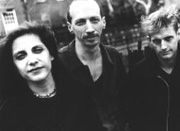SOMETIMES, THE RICHES of a big cultural fete like the Earshot jazz festival can be so overwhelming that choice performers get lost in the froth. So make sure you don’t lose sight of Ellery Eskelin. His startling trio will be a Monday night opening act, just before DJ Spooky.
Ellery Eskelin, Andrea Parkins, and Jim Black
On the Boards, Monday, October 30
Unlike the prerecorded noise, fuzz, and Miles lines that are Spooky’s stock-in-trade, Eskelin’s work is completely of the moment: a gorgeous, rocking, diffuse current of improvised sound that is unique even in the progressive jazz world.
It starts with the instrumentation: sax, drums, and accordion. Eskelin, who formed his trio in 1994, recalls, “I wanted to have a band that used a chord-type instrument, but I didn’t want to use guitar or piano. The language between a horn player and a guitarist and pianist is pretty much mapped out and codified. I was looking for something different. So I put out a search here in New York to see if there were any improvising accordionists.” He found a remarkable one in Andrea Parkins, whose classical piano work and Boston punk background were far different from Eskelin’s own traditional jazz training. “I like the contrast that sets up,” Eskelin says. “We’re good foils for each other.”
Eskelin, who grew up in Baltimore with a jazz musician mother, plays the tenor sax exclusively. He’s got a ferocious tone and all the tools of the modern avant-gardist, but his playing never follows the predictable contours of tension-release, theme and embellishment, that serve as a common guardrail even to free jazz. “I had a musical epiphany sometime around ’86 or ’87,” he says, “where I found out that I could improvise on a song and play very loosely with my phrasing, as opposed to a constant steady stream of eighth notes, which is pretty much the de facto method for most jazz players.”
Eskelin found an easy companion in drummer Jim Black, one of the dozen or so scarily talented Seattleites who took over the downtown New York jazz scene in the ’90s. Black “has some similar components to his sound,” says Eskelin. “He can start and stop and expand things, comment on things, stretch things, contract things, and wind up just where he needs to be at any given time. And that’s kind of what I do, too.”
A long-disbanded Seattle free jazz trio known as First Avenue used to say that their procedure for performing was simply “to begin.” Eskelin’s group, by contrast, hang their improvisations on a subtle and shifting structure of composition. “They’re not necessarily stand-alone compositions,” notes Eskelin. “I’m setting up different concepts and issues. A lot of the pieces I write are kind of episodic.” As a result, the playing, while spontaneous, develops “a really focused quality,” he says. “It has a reason—it’s not just meandering. Each section of improvisation really has a specific job to do. What comes before and after it are very important, and we’re always aware of that.”
If it all sounds a bit academic in the description, it’s anything but in the delivery. Eskelin’s trio plays with an emotional power that comes from having something difficult to say and finally finding the effective outlet. “Honestly, I don’t feel there’s any substitute for this group,” says Eskelin, whose trio will release its fifth disc on Hatology Records next month. “If this band couldn’t play, I’d really be at a loss right now.”








